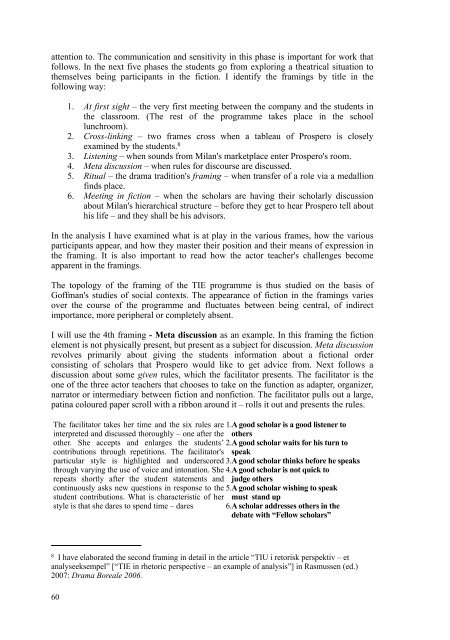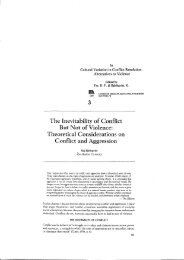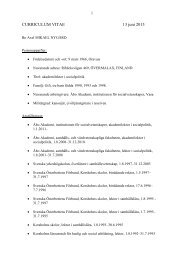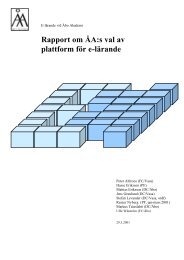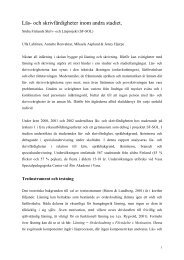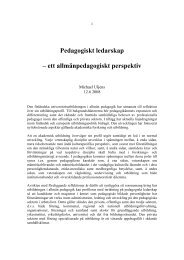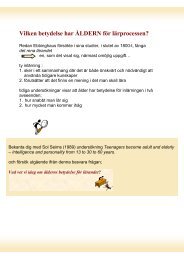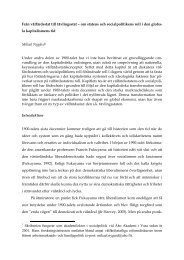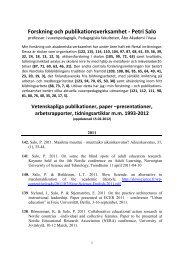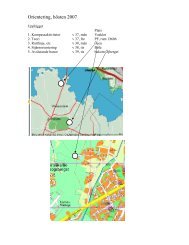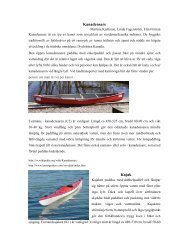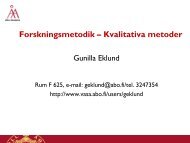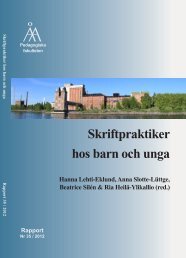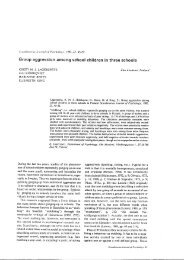Drama Boreale - Åbo Akademi
Drama Boreale - Åbo Akademi
Drama Boreale - Åbo Akademi
Create successful ePaper yourself
Turn your PDF publications into a flip-book with our unique Google optimized e-Paper software.
attention to. The communication and sensitivity in this phase is important for work that<br />
follows. In the next five phases the students go from exploring a theatrical situation to<br />
themselves being participants in the fiction. I identify the framings by title in the<br />
following way:<br />
1. At first sight – the very first meeting between the company and the students in<br />
the classroom. (The rest of the programme takes place in the school<br />
lunchroom).<br />
2. Cross-linking – two frames cross when a tableau of Prospero is closely<br />
examined by the students. 8<br />
3. Listening – when sounds from Milan's marketplace enter Prospero's room.<br />
4. Meta discussion – when rules for discourse are discussed.<br />
5. Ritual – the drama tradition's framing – when transfer of a role via a medallion<br />
finds place.<br />
6. Meeting in fiction – when the scholars are having their scholarly discussion<br />
about Milan's hierarchical structure – before they get to hear Prospero tell about<br />
his life – and they shall be his advisors.<br />
In the analysis I have examined what is at play in the various frames, how the various<br />
participants appear, and how they master their position and their means of expression in<br />
the framing. It is also important to read how the actor teacher's challenges become<br />
apparent in the framings.<br />
The topology of the framing of the TIE programme is thus studied on the basis of<br />
Goffman's studies of social contexts. The appearance of fiction in the framings varies<br />
over the course of the programme and fluctuates between being central, of indirect<br />
importance, more peripheral or completely absent.<br />
I will use the 4th framing - Meta discussion as an example. In this framing the fiction<br />
element is not physically present, but present as a subject for discussion. Meta discussion<br />
revolves primarily about giving the students information about a fictional order<br />
consisting of scholars that Prospero would like to get advice from. Next follows a<br />
discussion about some given rules, which the facilitator presents. The facilitator is the<br />
one of the three actor teachers that chooses to take on the function as adapter, organizer,<br />
narrator or intermediary between fiction and nonfiction. The facilitator pulls out a large,<br />
patina coloured paper scroll with a ribbon around it – rolls it out and presents the rules.<br />
The facilitator takes her time and the six rules are 1.A good scholar is a good listener to<br />
interpreted and discussed thoroughly – one after the others<br />
other. She accepts and enlarges the students’ 2.A good scholar waits for his turn to<br />
contributions through repetitions. The facilitator's speak<br />
particular style is highlighted and underscored 3.A good scholar thinks before he speaks<br />
through varying the use of voice and intonation. She 4.A good scholar is not quick to<br />
repeats shortly after the student statements and judge others<br />
continuously asks new questions in response to the 5.A good scholar wishing to speak<br />
student contributions. What is characteristic of her must stand up<br />
style is that she dares to spend time – dares 6.A scholar addresses others in the<br />
debate with “Fellow scholars”<br />
8 I have elaborated the second framing in detail in the article “TIU i retorisk perspektiv – et<br />
analyseeksempel” [“TIE in rhetoric perspective – an example of analysis”] in Rasmussen (ed.)<br />
2007: <strong>Drama</strong> <strong>Boreale</strong> 2006.<br />
60


